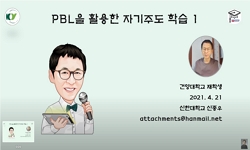Background : Recently pharmacists are demanded not only to have professional knowledgeon medicine but also to have problem solving, critical thinking, and communication skills. Therefore, a variety of teaching methods are being applied for the student...
http://chineseinput.net/에서 pinyin(병음)방식으로 중국어를 변환할 수 있습니다.
변환된 중국어를 복사하여 사용하시면 됩니다.
- 中文 을 입력하시려면 zhongwen을 입력하시고 space를누르시면됩니다.
- 北京 을 입력하시려면 beijing을 입력하시고 space를 누르시면 됩니다.

약학대학생의 의료기관 실무실습에서 적용한 문제중심학습법 효과 = Effect of Problem Based Learning Application in Institutional Pharmacy Practice Course for College of Pharmacy Students
한글로보기https://www.riss.kr/link?id=A104977280
- 저자
- 발행기관
- 학술지명
- 권호사항
-
발행연도
2014
-
작성언어
Korean
- 주제어
-
등재정보
KCI등재후보
-
자료형태
학술저널
-
수록면
735-743(9쪽)
-
KCI 피인용횟수
0
- DOI식별코드
- 제공처
-
0
상세조회 -
0
다운로드
부가정보
다국어 초록 (Multilingual Abstract)
Background : Recently pharmacists are demanded not only to have professional knowledgeon medicine but also to have problem solving, critical thinking, and communication skills.
Therefore, a variety of teaching methods are being applied for the students to develop activelyengaging and comprehensive thinking in practice of pharmacy. Among the various teaching methods,an ongoing research on utilization of PBL (Problem-Based Learning) method has been greatlyprogressed.
Objective : The purpose of this study is to provide the evidence of effectiveness of PBL class byevaluating the students who has completed hospital pharmacy practice experience.
Method : Survey regarding PBL method was conducted and its effectiveness in reducing anxietyof the students was measured by The Personal Report of Communication Apprehension-24 (PRCA- 24). The survey and evaluation were conducted after 23 College of Pharmacy students have takenpharmacotherapeutics class and completed 6 weeks (32 hours/week) of hospital pharmacy practiceexperience which is followed by 2-day (6 hours) clinical pharmacology lecture taught in PBLmethod.
Results : The Students’satisfaction rate on the effectiveness of PBL, on the scale of 1 to 5, was3.8±0.53 (mean±SD), and participation rate was 3.64±0.50. Evaluation on the effectiveness ofPBL class in reducing anxiety of the students best resulted in anxiety reduction in group participation(0.78±0.97, P=0.001), and the next highest was anxiety reduction in doing presentation(0.77±1.03, P=0.002).
Conclusion : Clinical pharmacology class taught with PBL methods resulted with great benefits inpharmacy students of South Korea, who has completed pharmacy practice experience. Also, theeffectiveness was superior compared to the students who were taught with the previous commonmethod which focus on academics.
참고문헌 (Reference)
1 민보경, "학부과정 약물치료학 수업에 문제중심학습의 도입" 한국임상약학회 23 (23): 291-299, 2013
2 김정태, "임상약학 교육에서의 문제중심학습 수업 방법 적용 평가" 한국임상약학회 23 (23): 65-70, 2013
3 하재홍, "법학교육에서의 문제중심학습을 위한 ‘판례’ 활용 전략 탐색" 법학연구소 50 (50): 153-190, 2009
4 강병서, "경영학 교과목에 대한 웹활용 PBL방법론의 적용과 학습 성과에 관한 연구" 한국교육정보미디어학회 12 (12): 231-257, 2006
5 Pungente M.D., "Using learning styles to evaluate first-year pharmacy student’s preferences toward different activities associated with the problem-based learning approach" 66 : 119-124, 2002
6 WHO., "The role of the pharmacist in the health care system: preparing the future pharmacist: curricular development" 599-, 1997
7 Dolmans D., "The advantages of problem-based curricula" 72 : 535-538, 1996
8 Park K., "The Effects of environmental classes using PBL on environmental literacy of university student toward the environmental problem" 24 : 9-16, 2009
9 Johnson D.W., "Social interdependence theory and university instruction: Theory into practice" 61 : 119-129, 2002
10 Lave J., "Situated learning:Legitimate peripheral participation" Cambridge Univ Press 1991
1 민보경, "학부과정 약물치료학 수업에 문제중심학습의 도입" 한국임상약학회 23 (23): 291-299, 2013
2 김정태, "임상약학 교육에서의 문제중심학습 수업 방법 적용 평가" 한국임상약학회 23 (23): 65-70, 2013
3 하재홍, "법학교육에서의 문제중심학습을 위한 ‘판례’ 활용 전략 탐색" 법학연구소 50 (50): 153-190, 2009
4 강병서, "경영학 교과목에 대한 웹활용 PBL방법론의 적용과 학습 성과에 관한 연구" 한국교육정보미디어학회 12 (12): 231-257, 2006
5 Pungente M.D., "Using learning styles to evaluate first-year pharmacy student’s preferences toward different activities associated with the problem-based learning approach" 66 : 119-124, 2002
6 WHO., "The role of the pharmacist in the health care system: preparing the future pharmacist: curricular development" 599-, 1997
7 Dolmans D., "The advantages of problem-based curricula" 72 : 535-538, 1996
8 Park K., "The Effects of environmental classes using PBL on environmental literacy of university student toward the environmental problem" 24 : 9-16, 2009
9 Johnson D.W., "Social interdependence theory and university instruction: Theory into practice" 61 : 119-129, 2002
10 Lave J., "Situated learning:Legitimate peripheral participation" Cambridge Univ Press 1991
11 George, D, "SPSS for Windows step by step: A simple guide and reference. 11.0 update" Allyn & Bacon 2003
12 Barrows H.S, "Problembased learning: An approach to medical education" Springer 1980
13 Taylor D.C.M, "Problem-based learning: Where are we now?" 30 : 742-763, 2008
14 Bate E., "Problem-based learning (PBL):Getting the most out of your students -Their roles and responsibilities: AMEE Guide No. 84" 36 (36): 1-12, 2014
15 Novak S, "Pharmacy students'learning styles before and after a problembased learning experience" 70 (70): 74-, 2006
16 김현아, "One Instructor에 의해 진행된 Modified Problem-Based Learning 교육기법 평가" 한국임상약학회 23 (23): 278-283, 2013
17 Levine T.R., "Measuring trait communication apprehension: a test of rival measurement models of the PRCA-13" 57 (57): 62-72, 1990
18 "Homepage of Korean Association of Pharmacy Education"
19 OP‘ T eynde P, "Focusing on the complexity of emotion issues in academic learning: A dynamical component systems approach" 18 : 361-376, 2006
20 Choi E., "Effects of problem-based learning vs. traditional lecture on Korean nursing students' critical thinking, problem-solving, and self-directed learning" CHURCHILL LIVINGSTONE 34 (34): 52-56, 2014
21 Rea L.M, "Designing &Conducting Survey Research A Comprehensive Guide" Jossey-Bass 2005
22 Tolnai S., "Continuing medical education and career choice among graduates of Problem-based and traditional curricula" 15 : 414-420, 1991
23 Yakugaku Z., "Clinical pharmacy practice education in master's course of Meijo University in affiliation with medical school" 129 (129): 897-909, 2009
24 American College of Clinical Pharmacy, "A vision of pharmacy’s future roles, responsibilities, and man-power needs in the United States" 20 : 991-1020, 2000
25 Haworth I.S., "A problem based learning, case study approach to pharmaceutics: faculty and student perspectives" 62 : 398-405, 1998
26 Antepohl W., "A follow-up of medical graduates of a problem-based learning curriculum" 37 : 155-162, 2003
동일학술지(권/호) 다른 논문
-
의약분업 예외지역 주민들의 복용약물에 대한 인식도 조사
- 한국병원약사회
- 박선희
- 2014
- KCI등재후보
-
Rituximab 항암화학요법에 대한 약사의 환자 교육 개선 및 적용 효과
- 한국병원약사회
- 한영현
- 2014
- KCI등재후보
-
유아 혈관종에서 저용량 Propranolol의 사용 적절성 평가
- 한국병원약사회
- 손린
- 2014
- KCI등재후보
-
- 한국병원약사회
- 천부순
- 2014
- KCI등재후보
분석정보
인용정보 인용지수 설명보기
학술지 이력
| 연월일 | 이력구분 | 이력상세 | 등재구분 |
|---|---|---|---|
| 2028 | 평가예정 | 재인증평가 신청대상 (재인증) | |
| 2022-01-01 | 평가 | 등재학술지 유지 (재인증) |  |
| 2019-01-01 | 평가 | 등재학술지 유지 (계속평가) |  |
| 2016-01-01 | 평가 | 등재학술지 선정 (계속평가) |  |
| 2015-01-01 | 평가 | 등재후보학술지 유지 (계속평가) |  |
| 2013-01-01 | 평가 | 등재후보학술지 유지 (기타) |  |
| 2012-01-01 | 평가 | 등재후보학술지 유지 (기타) |  |
| 2010-07-02 | 학회명변경 | 한글명 : 병원약사회 -> 한국병원약사회영문명 : 미등록 -> The Korean Society of Health-System Pharmacists |  |
| 2010-01-01 | 평가 | 등재후보학술지 선정 (신규평가) |  |
학술지 인용정보
| 기준연도 | WOS-KCI 통합IF(2년) | KCIF(2년) | KCIF(3년) |
|---|---|---|---|
| 2016 | 0.04 | 0.04 | 0.04 |
| KCIF(4년) | KCIF(5년) | 중심성지수(3년) | 즉시성지수 |
| 0.05 | 0.05 | 0.27 | 0 |




 KCI
KCI






